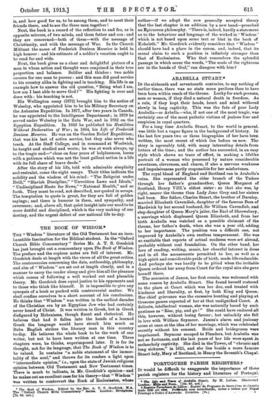THE BOOK OF WISDOM.* THE " Wisdom " literature of
the Old Testament has an inex- haustible fascination for the Biblical student. In the "Oxford Church Bible Commentary" Series Mr. A. T. S. Goodrick has just brought out a commentary upon The Book of Wisdom. The preface and the copious notes are full of interest. Mr. Goodrick deals at length with the views of all the great critics. The controversies concerning the date, authorship, philosophy, and aim of " Wisdom" are set out at length clearly, and in a manner to carry the reader along and give him all the pleasure which comes of following a well worked out and plausible theory. Mr. Goodrick does equal justice to his opponents and to those who think like himself. It is impossible to give any synopsis of a book so packed with controversial matter. We shall confine ourselves to a short account of his conclusions. He thinks that "Wisdom" was written in the earliest decades of the Christian era by an Egyptian Jew who had certainly never heard of Christ. It was written in Greek, but in Greek disfigured by Hebraisms, though fluent and rhetorical. He believes that had it. fallen into the bands of a learned Greek the language would have struck him much as Balm English strikes the literary man in this country to-day. He believes the whole book to be the work of one writer, but not to have been written at one time. Three chapters were, he thinks, superimposed later. It is for its thought, not for its language, that The Book of Wisdom is to be valued. In contains "a noble statement of the immor- tality of the soul," and throws for its readers a light upon "intermediate opinion," i.e., upon the state of Jewish religious opinion between Old Testament and New Testament times. There is much to indicate, in Mr. Goodrich's opinion—and he makes out an excellent case for his theory—that " Wisdom " was written to controvert the Book of Ecclesiastes, whose
• The Book of Wisdom. Edited by the Rev. A. T. S. Goodrich, 21[A. The "Oxford Church Bible Commentary" Series. London: Rivingtona. [7s. 63. net.]
author—if we adopt the now generally accepted theory that the last chapter is an addition by a new band—preached an Epicurean philosophy. "There is, indeed, hardly a statement as to the behaviour and language of the wicked in ' Wisdom ' which is not based upon some text or hint in the book of Koheleth." Mr. Goodrick evidently considers that " Wisdom " should have had a place in the canon, and, indeed, that its moral claim to such a position is infinitely stronger than that of Ecclesiastes. Who that remembers the splendid passage in which occur the words, "The souls of the righteous are in the hands of God," can disagree with him ?














































 Previous page
Previous page